https://slatestarcodex.com/2013/10/20/the-anti-reactionary-faq/
Seems to be decent data towards things not actually getting worse in most metrics long term
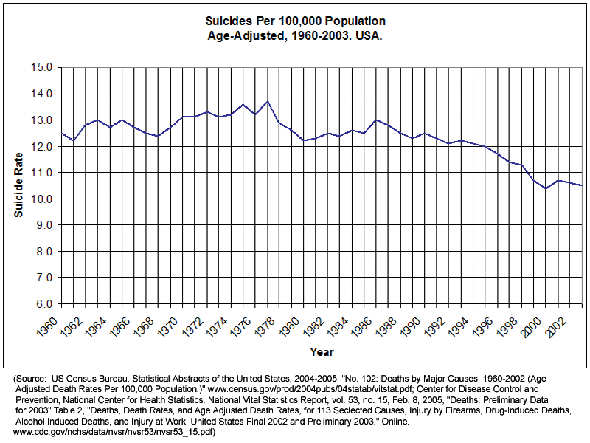
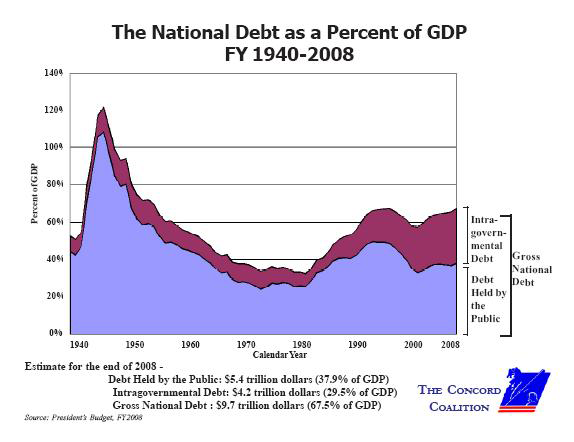
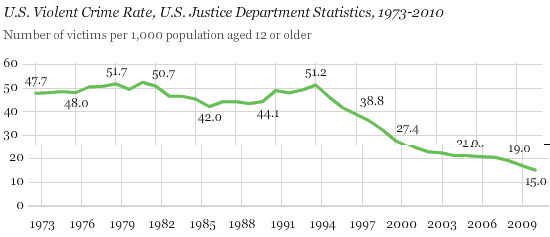
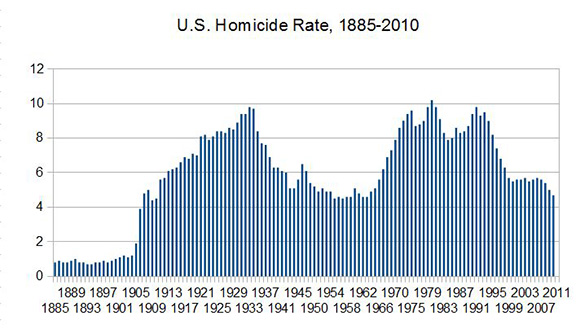
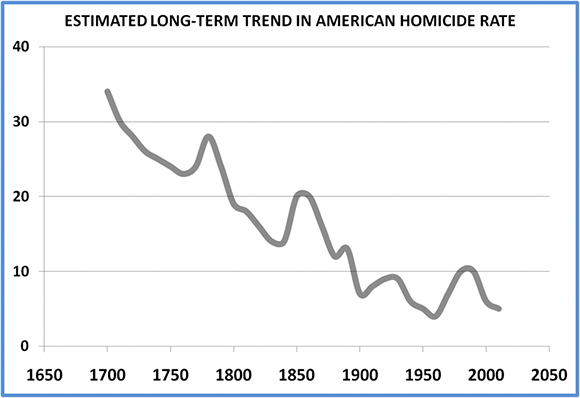
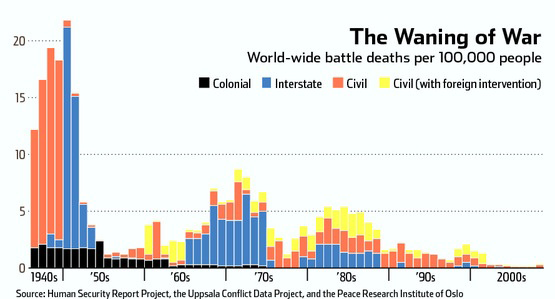
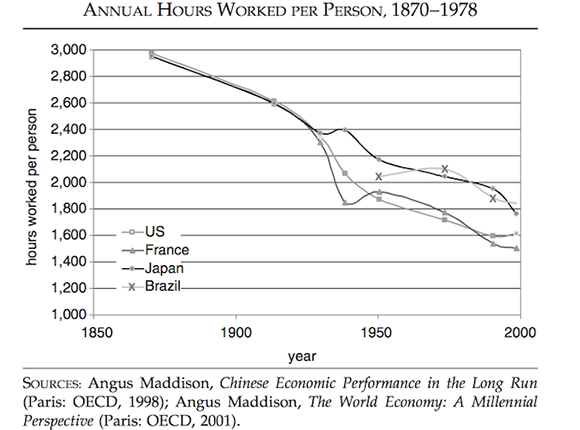
@TheAllMemeingEye If people think their lives are getting worse (I don't know if they do, but that is the vibe I get at least), then they are getting worse. You can call it entitlement or whatever, but quality of life is inherently a subjective measure. Nobody's brain adjusts the amount of dopamine released based on national statistics.
@zsig or maybe the physical reality is still getting better but the news cycle makes everyone think it's shit.
Years ago someone mentioned a thought excitement to me. Imagine a news paper that's only published every ten years. What would be in it? How's much would be positive and how much negative? Now make that 50 years, then 100. While the 100 year newspaper would have awful stuff in it like WWII, massive amounts of incredibly positive stuff would likely dominate and we don't think about these things because they happen slowly. Several major diseases are extinct. Countless people lifted out of poverty. Pretty much anything medical continues to increase at a incredible speed. And access to that it's better than ever, even in the US. But all that stuff happened gradually. Your political opponent saying something egregious happens constantly. Repotting about the thousands of starving children in Gaza is easier than trotting about the millions that aren't starving in Asia anymore. It's easier than reporting about the people who no longer suffer from malnutrition in the American South. Wealth disparity when you never see John D Rockefeller feels less bad then when you constantly see fake rich people on TikTok
@TheAllMemeingEye Another beautiful one: US Real (aka PPP corrected) median household income:
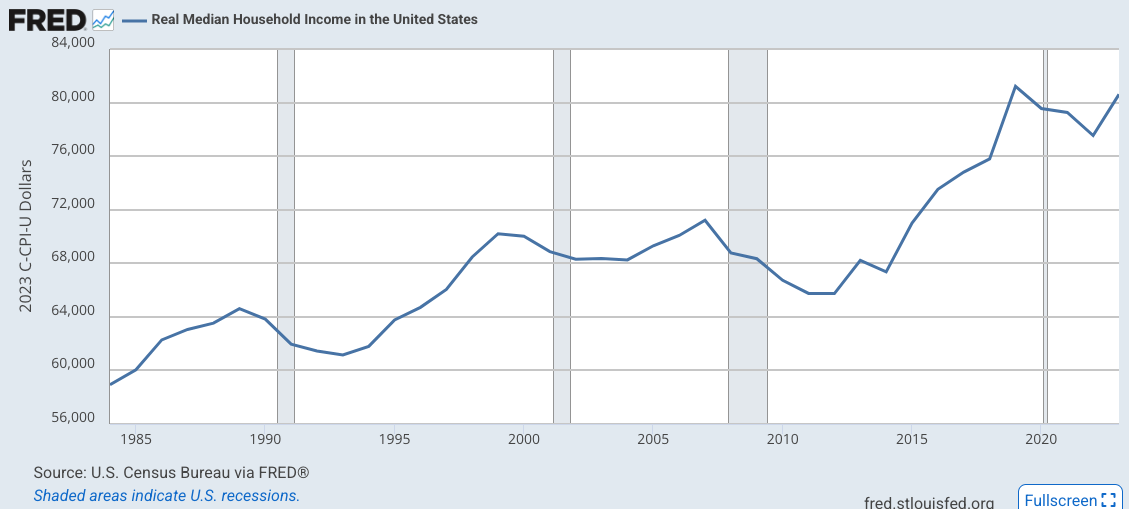
https://fred.stlouisfed.org/series/MEHOINUSA672N
it's all the same shit as captured by the poll last year where ~80% of people said they were better off than a few years ago and the same 80% thought the economy was worse.
Edit: Because it's so great, also real disposable income:
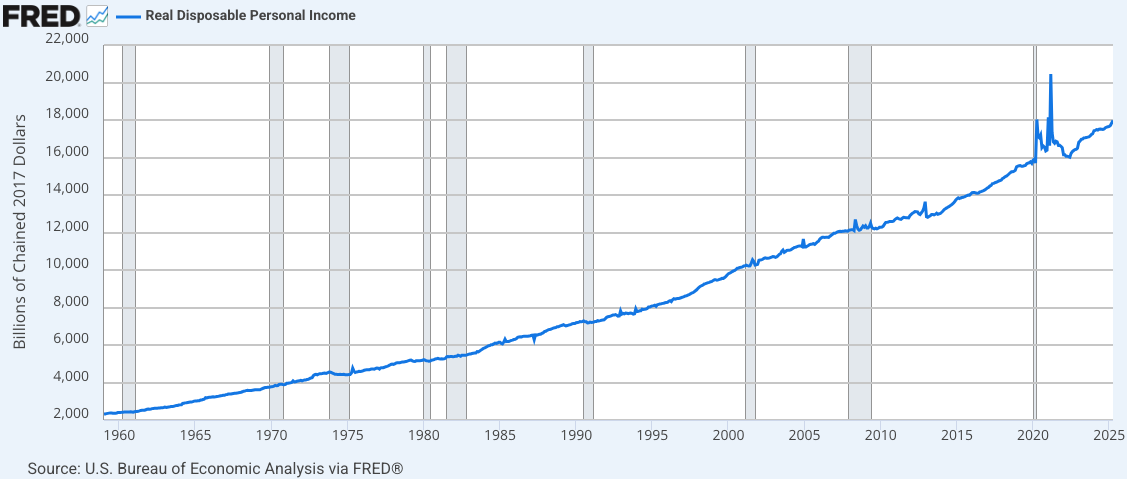
or maybe the physical reality is still getting better but the news cycle makes everyone think it's shit
That's not an "or"; I agree with you. My point is that it doesn't matter if the physical reality is getting better if everyone thinks it's getting worse, because if everyone thinks it is getting worse, then it is getting worse. (it being quality of life)
@zsig The physical reality would still be better. If shark attacks are down but everyone thinks they are up because the media decided to run a bunch of special about them, are shark attacks a worse problem now? I think not.
@AlexanderTheGreater that's why I edited my comment to say (it being quality of life). I don't argue that physical reality is not getting better, I argue that physical reality and quality of life are not one-to-one and you can't really judge whether quality of life is falling or rising without surveying the affected people.
If people think their lives are getting worse (I don't know if they do, but that is the vibe I get at least), then they are getting worse
That doesn't actually logically follow. You'd measure one with survey questions like "how good is your life compared to a [year/decade/whatever] ago" and the other with questions like "how happy are you with your life". Or more targeted questions about specific aspects and so on. You could combine multiple questions.
But there's no reason that answers to the first question have to be consistent with the trend in answers to the second question! Happiness metrics could go up, despite people's impression being that things are getting worse!
Whether measures of happiness or life satisfaction are going up or down seems at the very least like a complicated question:
https://ourworldindata.org/grapher/share-of-people-who-say-they-are-happy?tab=chart&country=GEO~IND~ZWE~BRA~ARG~RUS~SWE~DEU~ALB~USA~CHN
@TheAllMemeingEye Imo this data presentation runs the risk of falling into the same rhetorical trap used by websites like https://wtfhappenedin1971.com/, where a sheer quantity of graphs showing one trend is used to make a point, despite a lot of the data individually not being that convincing.
For instance, the first two graphs suffer from poorly timed cutoffs. The first (suicide rates) cuts off at 2003, the second (debt/GDP) at 2008 (a very convenient time). It should be noted that both the suicide rate in the US and debt as a percent of GDP have been rising and have exceeded the peaks in both of your graphs since those cutoffs.
https://en.wikipedia.org/wiki/Suicide_in_the_United_States
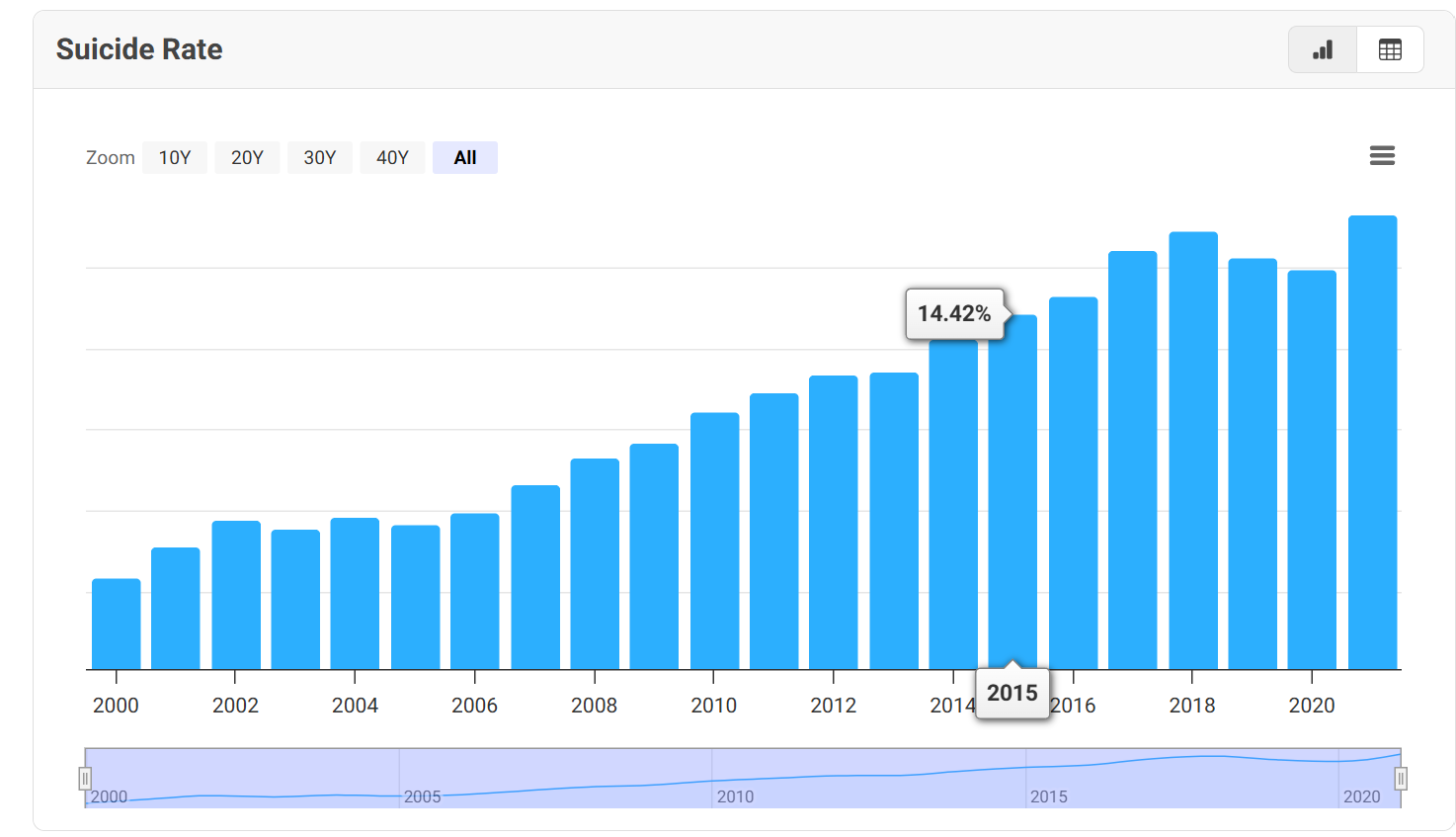
The above graph cuts off at 2021, it has risen steeply since then.
https://fred.stlouisfed.org/series/GFDEGDQ188S
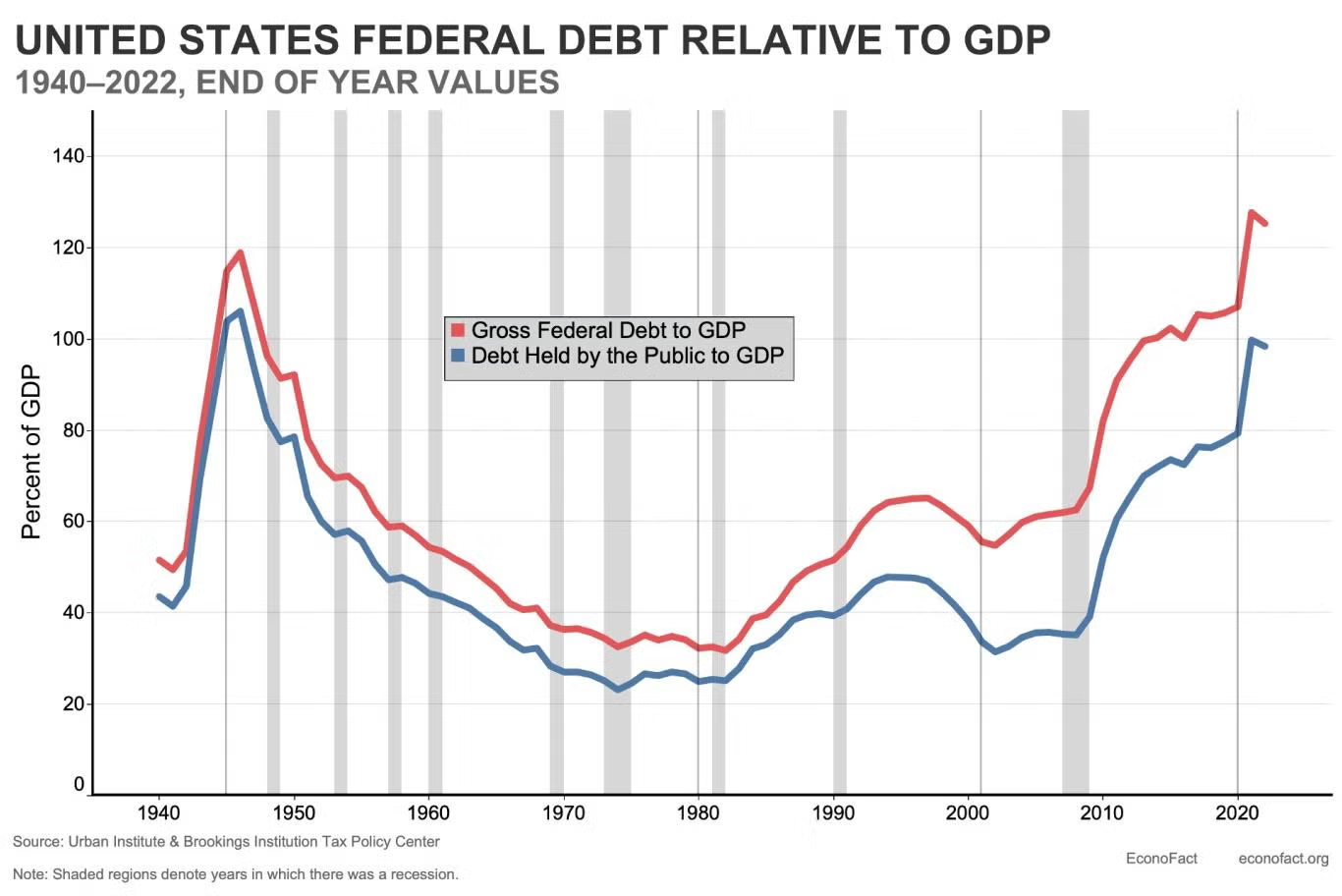
https://now.tufts.edu/2023/06/26/why-us-national-debt-will-likely-keep-growing
The age-adjusted suicide rate in the US in 2023 was 14.7 and increasing, higher than all data points in the period covered by the graph you posted. The sovereign debt as a percent of GDP was about 120% in Q1 2025, almost exceeding the peak during WW2 (and it will certainly exceed it if the current budget reconciliation bill is passed).
Of course, you never made the point that debt/GDP and the suicide rate have never decreased, just that they have been decreasing long term. Short-term increases should not invalidate that. But I'd argue that your graphs don't provide convincing evidence for a long term trend when they only cover about 40 and 60 years respectively, while they both have cut offs around 20 years ago, ignoring rising trends in the last 20 years. This is especially because the specific 1940-2000 period (the Great Acceleration) was an unprecedented and historically unusual period of prosperity in the United States.
The debt/GDP graph is particularly flawed because it specifically starts around WW2, which obviously heavily distorts the trend. The presence of a massive war at the start of your debt/GDP graph, followed by a 60-year period in which the US was not in a hot war and was expanding economically, will inevitably show a long downwards trend. It should be noted that the US has recently reached the peak debt/GDP ratio of that first spike for WW2.
The next three graphs (violent crime, murders, murders) are all highly correlated, and should not be considered as independent variables (the risk of this data presentation format in your comment is that, by putting 3 different graphs, it makes it seem more like they are independent metrics that are each decreasing, when in fact it should just be 1 graph). It is indeed true that there is a long-term decrease in homicides and violent crime overall since the 1990s (perhaps due to the banning of leaded gasoline). However, those 3 graphs once again suffer from an early cutoff. The full trend is a bit more complicated, with a sudden rise in homicides in the pandemic years.
https://www.macrotrends.net/global-metrics/countries/usa/united-states/murder-homicide-rate
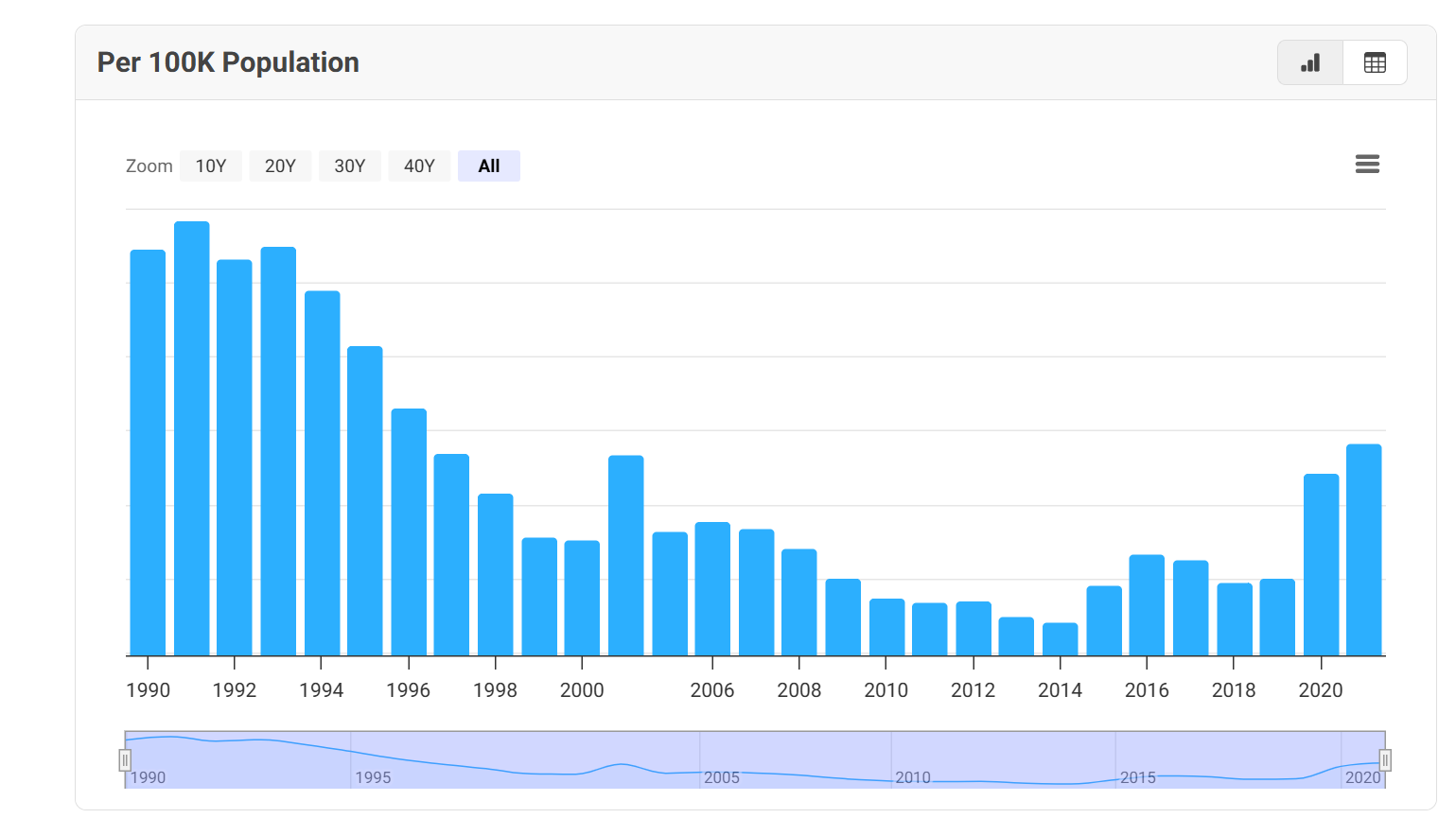
The graph showing conflict deaths/per capita decreasing is likely accurate, though I am not as well-informed on that topic. I am curious what it would look like with recent years included. I am curious about how the latest data points in that graph, which are around 2000, are so low, considering that events like the second Congo War occurred then, with an estimated 3-5 million deaths.
The graph showing hours worked, while correct, also runs some risk of misleading information. Firstly, it starts in the middle of the 1800s, which is historically when humans in industrial capitalist societies have worked the most. While it is certainly true that work hours have decreased in the industrialized societies (Japan, US, France, Brazil which is not a fully industrialized country compared to the others but nonetheless is upper middle-income), much of that has come from outsourcing manufacturing labor to other nations, especially China. The lifestyles of those developed societies (Japan, US, France) would not be possible without the excess labor of the developing world.
Additionally, that graph speaks more to the historical unusualness of labor practices in the First and Second Industrial Revolutions (1760-1920), than to the progress society has made since the 1900s. There is some sociological evidence that most humans, historically, in pre-agricultural and even post-agricultural and pre-industrial (feudal) societies, did not work nearly as much as the 16 hour days of those times, and that workers in those societies may have even worked considerably less than the average human does today.
https://groups.csail.mit.edu/mac/users/rauch/worktime/hours_workweek.html
Fundamentally, I think these issues stem from the fact that the article in question is quite outdated. Even the article itself has a disclaimer noting that it was already considered outdated by the author 11 years ago:
>[Edit 3/2014: I no longer endorse all the statements in this document. I think many of the conclusions are still correct, but especially section 1 is weaker than it should be, and many reactionaries complain I am pigeonholing all of them as agreeing with Michael Anissimov, which they do not; this complaint seems reasonable. This document needs extensive revision to stay fair and correct, but such revision is currently lower priority than other major projects. Until then, I apologize for any inaccuracies or misrepresentations.]
@spiderduckpig thanks, you make several well argued and data backed points :)
My apologies for not checking the data thoroughly enough before sharing
Read this and think about whether you might be confusing symptoms for causes: https://slatestarcodex.com/2014/07/30/meditations-on-moloch/
For some reason I thought this was a multiple option selectable poll, so I clicked inflation, but I think 2 other options are more responsible: breakdown of community/family, & cultural fragmentation/polarization.
Also over regulation/inefficiency is probably more a root cause of unaffordability than “inflation,” even though it has been very multifaceted in recent years.
@DavidHiggs yeah, housing cost is a major reason people feel they are failing behind and the housing shortage is largely caused by various forms of regulation. It speaks for itself that many beloved neighborhood would be illegal to build today. Of course the housing regulation issues go much further than that example
Corporate greed? It's like blaming gravity for a plane crash. Corporations are made up of people, and just like you want low prices of the goods you buy, they want high prices of the goods they sell. Maybe there has been an increase in regulatory capture and rent-seeking. But the solutions to that aren't things like price controls which would only expand state power and its capacity for corruption, similar to tariffs.
I voted "Housing Market Speculation / Corporate Landlords" but it is important to point out that the largest source of housing speculation is typical NIMBY homeowners, and not landlords, corporate or otherwise.
@Sz it's also important to note that margins haven't increased. AFAIK main drivers for price increases have been supply shocks, including rising labor cost (which one could argue is good. Low-income earners had their large comp increase in decades over the last few years. Maybe it's their "greed" that's the problem? 😜)
@AlexanderTheGreater It means the outcome changed, but doesn't mean the cause changed. Do you think the US has ever been in a stable equilibrium?
@BenM no, of course it's never been stable. Things have been getting better and better (till people got tired if it and started burning it all down)
Edit: profit margins keep going down and down. It's BECAUSE companies are "greedy" and want to take their competitors market share. Rockefeller made his fortune by putting oil into custom rail cars instead of small barrels. Greed is what drives innovation and grows the pie for everyone. Moralizing got us authoritarianism, religious wars and dysfunctional economies. "Oh but those weren't my morals!" - that's what everyone says
@AlexanderTheGreater "till people got tired if it and started burning it all down" sounds like an argument in favor of this root cause and still doesn't require any sort of sudden change.
It's also not at all in conflict to suggest that the profit margin is the reason for the success in the first place and the reason for the decline.
@BenM "till people got tired if it and started burning it all down" sounds like an argument in favor of this root cause and still doesn't require any sort of sudden change.
I'm saying that people tired oh everything getting better and better and are amplifying minor problems that used to be even worse or are imagining problems into existence. This is happening both on the farish left and right and the media with their need to report negative stuff that draws us in keeps the vicious cycle going.